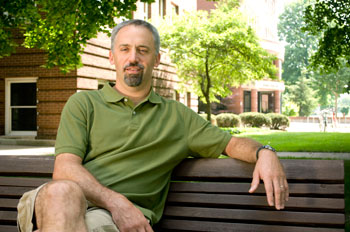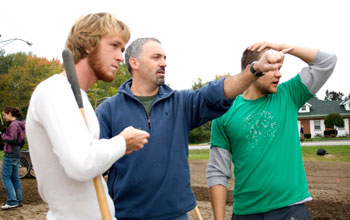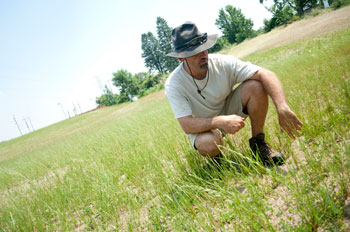Sensenig works at peacebuilding by making connections

GOSHEN, Ind. – As a biology and environmental science professor, Ryan Sensenig knows that his students need to learn more than how to use a microscope or all of the scientific names of the plants they are studying.
Instead, creating connections – between people, cultures and different academic disciplines – has always been key to the way he has approached his own life and what he strives to teach everyday in the classroom. “There is no dividing line between sociology, biology, ecology and peace and justice issues,” said Sensenig, associate professor of biology at Goshen College. “I love ecology and environmental science because the complexity of connections forever intrigues me, and further binds me to a broader social and biological community.”
Sensenig’s interdisciplinary exploration began as a child in Kenya. Born to parents who were teaching and serving in the East African country, he enjoyed cross-cultural connections with his Kenyan brothers and sisters.
“One significant way to make peace is becoming a member of a community,” Sensenig said. His service at a refugee camp in conflict-ridden eastern Kenya in 1992 clearly demonstrated to him the connections between peace, poverty and ecology. After finishing his undergraduate degree as an international agriculture and biology double major at Eastern Mennonite University (EMU), Sensenig was anxious to apply the multidisciplinary tools he acquired.
“I appreciated the connections between disciplines within my work,” he said. “Also there was a focus on rural development overseas as a part of my college study that took me back to Kenya.”
Sensenig initially began his service experience working with refugees reeling from a recent war. He helped distribute food to 50,000 refugees in three different desert camps.
Over time, Sensenig helped meet broader social needs in a larger region. With 150,000 refugees from different ethnic groups and language backgrounds, there was a need to create a community for these people to sustain peace and give meaning to their lives. Sensenig began a recreation program, organizing volleyball games, soccer games and art activities for the refugees.

Sensenig also responded to ecological concerns by establishing a tree-planting project. After the United Nations High Commission for Refugees (UNHCR) cut down hundreds of native acacia trees to create the camp, he and others organized a program to replant shade trees for the refugees and their animals.
“Many people understand the connection between war and the environment; during war the environment suffers due to habitat destruction and excessive exploitation,” Sensenig said. “But the reverse is also true. If the environment is unstable and ecological needs aren’t met, then peace suffers.”
Sensenig’s time in Kenya convinced him to pursue education to teach others about the importance of these connections. He taught high school ecology for six years in Harrisonburg, Va. “As an educator, I see part of my job as to encourage students (and myself) to dig deeply to find and unveil connections, which can help us understand our role in the larger community, locally and globally,” he said.
As a professor and director of the environmental science program at Goshen since 2007, Sensenig continues to bring lessons he learned in Kenya to the classroom and the campus. In his classes – General Ecology, Principles of Environmental Science, Marine Biology in the Florida Keys and Biological World – Sensenig sees his most important goal as demonstrating “ecological thinking,” the idea that any given thing is tied to a multitude of other things.
Sensenig collaborates with students, administrators and professors from other departments on the Ecological Stewardship Committee to make the campus more sustainable, including establishing prairie grass areas on campus. “These challenges are naturally interdisciplinary; solutions require social, economic and technical contributions,” Sensenig said.

And Sensenig is currently involved in two research projects focused on grassland systems. As the Lindsey Fellow at the college’s Merry Lea Environmental Learning Center, he has started a tall grass prairie grazing experiment to examine the effect of large herbivores on plant dynamics. And in Kenya’s Laikipia savanna, he is studying the important role grassland fires play in creating food variety for animals. That research was recently published in the journal Ecologyin November 2010.
While in Kenya where Sensenig pursued doctoral work in wildlife ecology, he and his wife, Donna, who also shares experiences growing up in East Africa, adopted their two children, Mara and Isaac, who are both now seven years old.
“Since we both were born in East Africa and have a high interest in staying connected to this part of the world, it felt somewhat natural to become a multi-ethnic family,” Sensenig said.
During the spring 2011 semester, Sensenig and his family are leading a group of Goshen College students to Tanzania through the Study-Service Term program. The family will then spend six weeks during the summer in Kenya where Sensenig will continue his grassland research data collection, along with four Goshen College students.
“I am trying to establish an intercultural tension within my kids,” he said. “This is part of what we should all do to feel global accountability and connection both to our home as well as to another community elsewhere in the world.”
– By Lydie Assefa
Editors: For more information about this release, to arrange an interview or request a photo, contact Goshen College News Bureau Director Jodi H. Beyeler at (574) 535-7572 or jodihb@goshen.edu.
###
Goshen College, established in 1894, is a residential Christian liberal arts college rooted in the Anabaptist-Mennonite tradition. The college’s Christ-centered core values – passionate learning, global citizenship, compassionate peacemaking and servant-leadership – prepare students as leaders for the church and world. Recognized for its unique Study-Service Term program, Goshen has earned citations of excellence in Barron’s Best Buys in Education, “Colleges of Distinction,” “Making a Difference College Guide” and U.S. News & World Report’s “America’s Best Colleges” edition, which named Goshen a “least debt college.” Visit www.goshen.edu.




